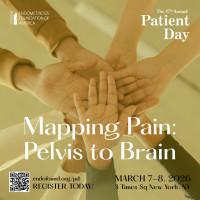
Chronic pain is one of the most prominent symptoms associated with endometriosis. While not everyone experiences these symptoms, the NHS reports that pain during sex, lower back and abdominal pain, and pain during day-to-day activities are all commonly linked to endometriosis.
You may have noticed changes in your libido or your desire to have sex if you know it will be painful. Alternatively, the pain you experience may make intimacy feel like something that’s simply off the cards. And having to explain this to your partner in a non-judgemental and clear way can feel impossible.
28-year-old Bella was diagnosed with endometriosis two years ago. However, she says since she was a teenager she’s had to manage chronic pain and it’s impacted her relationships. “My chronic pain has played a part in every sexual relationship I’ve had. I remember wanting to meet someone at college so badly but knowing if I was to be intimate with them it would hurt,” she says. “Sex almost became a mental block in my mind because it’s like I had to weigh up if it was worth the pain.”
While endometriosis symptoms can vary, trying to manage chronic pain alongside the stress it can put on your libido and mental health is no small problem. It’s estimated that roughly one in ten women and girls of reproductive age has endometriosis globally.
“Growing up I was terrified to speak to my friends about how I couldn’t sleep with my boyfriend and the prospect of an orgasm felt like a distant dream,” says Bella.
However, couples counselor and relationship therapist Jo Nicholl explains some ways that you can approach conversations about sex and intimacy when you experience chronic pain, including the importance of your own sexual wellness and relationship with yourself.
How can pain impact your sex drive?
Your sex drive may not be the first thing that springs to mind when you think about how chronic pain can affect your life. However, the links between pain and your libido can be complex. You may not want to be intimate with your partner due to the pain itself. If you feel low, exhausted, or anxious because you have to manage symptoms, that may also decrease your libido. Medication and stress may also be factors.
“Physical pain or trauma affects the nervous system and our mind in a way that will block the positive hormones released when we feel romantic,” says Jo Nicholl. “In other words, it is like a huge internal diversion and pre-occupying.”
If you associate being physically intimate with a partner with pain then it’s very likely that you’ll avoid it. A study published in the Clinical Journal of Pain found that 73% of people they spoke to who experienced some form of chronic pain said they encountered various sexual complications because of it. The research outlined that while some people struggled to become aroused or didn’t enjoy some positions, others said they were scared their pain would be exacerbated by sex.
This is something that 25-year-old Cora can identify with. “To put it simply, I stopped having sex for two years. All of my ideas about sex and sexuality were wrapped up in feelings of trauma,” she says. “I’d just been diagnosed [with endometriosis] and was only beginning to fully understand my management options. Sex felt like it was doing more harm to me than pleasure. I totally lost my sensual side.”
Due to the fact that she experienced such intense pain when she had penetrative sex, Cora decided to remove that part of her life and self. However, Jo Nicholl explains that your sexual relationship with yourself is just as important, if not more important, than your relationship with a partner.
Connect with your own sexuality
Trying to approach conversations about pain and sex can be difficult with a partner. But Jo Nicholl explains that reconnecting with your own sexuality and sensual side is “very important.”
You may wonder what reconnecting with your own sexuality might practically look like. It could be setting some time aside to truly look after yourself, learn about yourself, and/or engage in self-care practices that work for you. This could be lighting candles and taking a bath. Learning more about pleasure through books and podcasts may also make you feel more connected with yourself.
“My friends laugh at me when I talk about this but after my endometriosis diagnosis, I had a complete sexual re-education. I simply couldn’t carry on how I was. I didn’t enjoy sex or intimacy. It’s something I equated with pain,” says Cora.
However, she reached out to her doctor who initially put her in touch with a sex therapist and trauma specialist. From that point, Cora worked with her team of specialists on a pain management plan that worked for her and she started to explore where her fear of physical intimacy stemmed from.
“Once I’d spoken to my therapist and started to read more about pleasure I realized that every sexual act I’d engaged in, in my life, had been done first and foremost for the other person,” she says. “Sex had always been painful for me but I learned that I deserved pleasure and I didn’t have a hope trying to communicate this to future partners if I couldn’t even face it myself.”
Use open language
Once you feel ready to open up a conversation with your partner about how your pain may be impacting your libido, Jo Nicholl outlines that there are some conversational rules you can follow so no one feels like they’re being judged or blamed.
“Always start with ‘I feel….’; help them immediately know it is not their fault and also in what way you need their support,” she says. “As it is likely they may want to fix it and that is often not what is needed.”
By saying “I feel” you’re letting your partner know exactly what struggles you’re facing and how your symptoms are impacting you without pointing a finger. Similarly, they can’t argue with your feelings because they’re yours and yours alone.
“It never occurred to me that I could have a conversation about not wanting to have sex and it not end in someone feeling rejected,” says Bella. “I’ve had past partners accuse me of using my chronic pain as an excuse not to be intimate. I’ve had people question my feelings and experiences. It wasn’t until I met my current partner that I realized I could let the person I love in and walk them through why I struggle to be physically intimate sometimes.”
It often takes two to tango, and as you outline what you’re feeling, ask your partner to do the same. They’re as much of an active participant in your relationship as you are, so it’s good to hear their experience, too. “Talk about your feelings first and let them know that it is your stuff and that you find it hard to talk about this kind of thing sometimes,” says Jo Nicholl. “Ask them what their experience is. For example, ‘I am not feeling very connected to myself right now, how are you feeling?’ ‘I love being with you and my mind is really busy at the moment and I am struggling to stay present.’”
And don’t be afraid of therapy
Whether it’s for yourself or for both you and your partner, any trauma you have surrounding sex because of pain is something you can bring to a registered sex and relationship therapist. Jo Nicholl highlights that if you’d like help in communicating how your chronic pain means you don’t always want to be physically intimate, then a therapist may be able to aid you in overcoming any communication barriers you have with your partner.
“Therapy is always something I’ve done alone. It’s been a solitary activity for me all of my life. However, it wasn’t until I saw a sex therapist with my partner that I realized how much of my diagnosis he really understood,” says Bella. “I always felt like I had to fight my corner to justify my pain. But my partner's main concern was the things he could do to make sex and intimacy a more pleasant experience for me and something I could start associating with love.”
Similarly, Cora explains that sex therapy has played a fundamental role in understanding pleasure and worth. “I now know I deserve to have the kind of sex that doesn’t hurt me and therapy has armed me with the words I can use for future partners,” she says.









